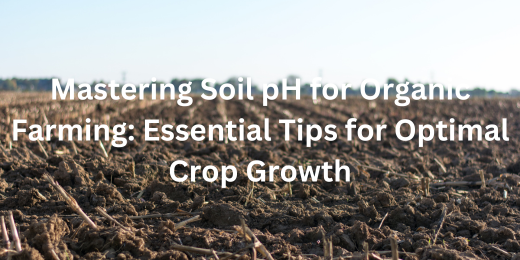
Mastering Soil pH for Organic Farming: Essential Tips for Optimal Crop Growth
Soil pH for organic farming
Understanding Soil pH and Its Importance
Soil pH measures its acidity or alkalinity, directly affecting nutrient availability and overall soil health. The pH scale has a range of 0 to 14, where neutrality is represented by 7, numbers lower than 7 direct acidity, whereas figures over 7 specify alkalinity. Most plants thrive in a slightly acidic to neutral pH of 6 to 7. Resolving pH issues in the soil is essential for good farming and gardening because it affects microbial operation, nutrient absorption, and development of crops.
Comprehending the soil pH in organic farming is essential for sustaining robust crop growth and ensuring the availability of nutrients. The soil pH scale ranges from acidic to alkaline, significantly impacting how plants absorb nutrients. For South Indian crops like rice and vegetables, proper pH balance ensures optimal growth and yields.
To improve soil pH in organic farming, various natural methods can be employed, such as adding lime to acidic soils. Compost and other organic substances are essential for maintaining pH stability. These practices help create a balanced environment conducive to the growth of diverse crops. Maintaining an appropriate pH level directly impacts the quality of organic food, ensuring that crops absorb essential nutrients effectively.
Methods to Test Soil pH
To determine the availability of nutrients in your soil for organic farming, you must conduct a pH test. Affordable home testing kits provide accurate results, allowing farmers to monitor soil conditions effectively. Testing on a regular basis helps guarantee that the pH of the soil stays within the ideal range for the growth of crops.
To improve soil pH in organic farming, consider using laboratory testing services for precise measurements and expert recommendations. Professional testing offers a detailed analysis of soil conditions, helping farmers make informed decisions. This approach is particularly useful when dealing with complex soil issues that require tailored solutions.
For those interested in DIY methods, simple techniques can help estimate soil pH before adjustments are made for organic food production. Using household items like vinegar and baking soda, farmers can perform quick tests. These methods provide a general idea of soil acidity or alkalinity, guiding further action.
Adjusting Soil pH Naturally
Balancing soil pH for organic farming is essential for optimal plant growth and nutrient absorption. Agricultural lime is commonly used to raise pH levels in acidic soils effectively. Properly managed pH levels contribute to healthier plants, ensuring that crops thrive in an organic farming environment, producing better yields.
To improve soil pH in organic farming, sulphur is applied to lower high pH levels in alkaline soils. This natural method ensures that the soil maintains the correct acidity for nutrient availability. By adjusting the pH, farmers create favourable conditions for various crops, enhancing overall soil fertility.
Gradually incorporating compost and organic matter into the soil can effectively regulate soil pH, so enhancing the overall health of crops and the soil. This method supports sustainable farming, leading to high-quality organic food and environmental stewardship.
Choosing the Right Crops Based on Soil pH
Understanding soil pH for organic farming is crucial when selecting crops that will thrive in specific conditions. Acid-loving plants like chillies and tomatoes perform best in slightly acidic soils. Knowing the pH preference of these crops ensures better growth and productivity, making organic farming more successful and sustainable.
To improve soil pH in organic farming, focus on cultivating crops that prefer neutral pH conditions, such as beans and spinach. These plants flourish in soils with balanced acidity, leading to healthier yields. Adjusting soil pH accordingly helps create an optimal environment for these crops, enhancing the effectiveness of organic farming.
Growing crops suited to alkaline soil conditions, like certain herbs and grains, can also contribute to successful organic farming. Selecting these plants based on their pH preference supports efficient farming practices. The right crop selection, aligned with soil pH, directly influences the quality and quantity of organic food produced.
Soil pH and Organic Farming Practices
Maintaining the correct soil pH for organic farming is essential for enhancing soil fertility and promoting sustainable agricultural practices. An optimal pH level ensures that nutrients are readily available to plants, boosting overall crop health. Balanced soil pH contributes significantly to achieving the goals of organic farming, such as producing high-quality crops.
To improve soil pH in organic farming, consider its impact on the composting process, which is crucial for nutrient recycling. Proper pH levels facilitate effective decomposition and nutrient release, enriching the soil naturally. This improvement supports organic farming by enhancing the soil’s ability to sustain healthy plant growth without synthetic inputs.
Balanced soil pH can also play a crucial role in natural pest control, reducing the reliance on chemical interventions. When the pH is optimal, plants are healthier and more resistant to pests. This strategy is in line with the ideas of using sustainable farming practices to provide wholesome, safe organic food.
Regional Considerations for South Indian Farmers
South India’s climate, characterised by high humidity and monsoon rains, significantly influences soil pH for organic farming practices. The region’s weather patterns can lead to soil acidification, impacting nutrient availability and crop health. Farmers must monitor pH levels closely to ensure sustainable and productive farming in these specific climatic conditions.
Understanding local soil types is essential to improve soil pH in organic farming across South India. Soils like laterite and red soils, prevalent in the region, typically have acidic pH levels. Adapting organic farming techniques to suit these particular soil qualities guarantees improved crop yields and long-term soil sustainability.
Using traditional South Indian methods effectively manages soil pH, supporting sustainable organic food production. Techniques like applying cow dung and compost maintain soil fertility while preserving the region’s cultural heritage. To know more about organic farming, organic fertilisers and organic food products visit at your nearest Uyir Organic Farmers Market or visit online www.uyironline.in or www.uyirorganic.farm.